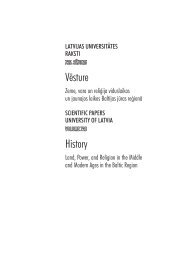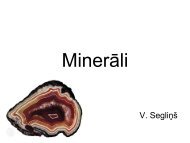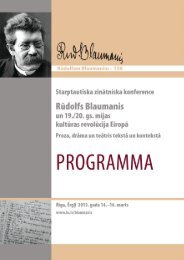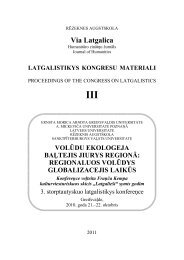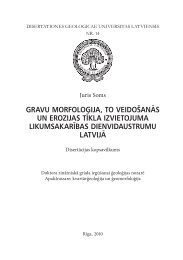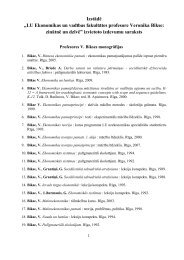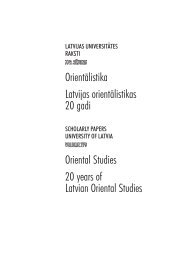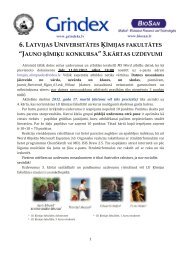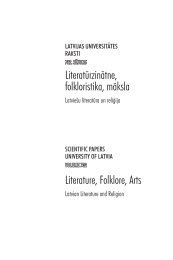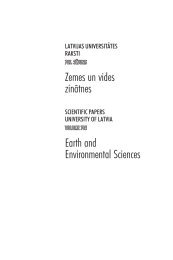Untitled
Untitled
Untitled
Create successful ePaper yourself
Turn your PDF publications into a flip-book with our unique Google optimized e-Paper software.
142 LITERATÛRZINÂTNE, FOLKLORISTIKA, MÂKSLA<br />
ages of the ethnic, national or cultural identities. Paradoxically or not, the main characteristic<br />
of the end of the 20th century becomes the essential examination of the identity,<br />
provokes by the others, but also confronts with the process of deleting the identity<br />
of the others like an act of violent elimination and radical insisting of one’s identification.<br />
That usually leads to the result of violent resolving the life with dead or<br />
with war. According to Prof. Rada Ivecovic, it is a strong tendency of bordering the<br />
territories and creating the identity by that lend. 8 In that context, we are witnesses of<br />
a total disappearing of any reflection of the Other and the whole effort is concentrates<br />
on the distinguish oneself. By that way we touch the bottom of the life, the<br />
death, the violence, and we can see the practicing of violence that characterized most<br />
of the histories of the nations that live in the Mediterranean world.<br />
If in the center of our thinking we emphasize the idea of establishing the identity,<br />
we have to speak about the national, ethnic or cultural identity, but usually about the<br />
identity through its reflection in the eyes of the others. Identity always asks for the<br />
territory, it establishes its imaginary borders, but he/she can insist to master the history<br />
or the time, and at least the universal, the humanity. All the territories on which<br />
insists one’s identity couldn’t be real, they have to exists as an imaginary land of<br />
human living, and after that as a real living, for example our living on the territory of<br />
the Mediterranean world of riche and worth.<br />
The identity nests through the story and images, but it usually need the others to<br />
listen and accept these images, to react and confirm the existence. The story, also<br />
means developing the dialogue through the borders between the territory of the “I”<br />
and the existence of others in its world. I pretend to eliminate the established histories<br />
and to accept the representations of the individual imaginary world of identifying<br />
through the story. All histories in the past in this Mediterranean world insisted on its<br />
validity and on its true. I want to point out to the “other”, sophisticated stories, which<br />
are not representative for a country, or material world, but are usually straitened in its<br />
borders. Narration in my essay is some kind of an effort to make a revival of an individual<br />
explanation as a story, which will be able to save the past and to integrate the<br />
differences, and not recognized aspects of individuality in a space of the text as an<br />
example of a dialogue with the thoughts of many Others. It needs its identification by<br />
the others. That is a narrative as a Utopia in which the time and space are compressing<br />
by texturing the story. By that way I couldn’t accept the long tradition of the<br />
“Balkans specialties” that wanted to promote the validity of their individual perspective<br />
of the events by deleting the history of the others.<br />
First of all, as a region, Balkan is traditionally bordered/divided from the other<br />
parts of Europe as a lagging region, although it belongs to the continent although, the<br />
roots of the European civilization were planted here, this part was rather separated<br />
than integrated in the Europe.<br />
Balkans were traditionally characterized as an ethos: independent, proud, courageous<br />
and honor. The concept of “balkanization” is derived from the phenomenon of<br />
“kleinestaat”, according to Erik Hobsbaum. By analyzing the etymology of this term,<br />
we can find the same explications. The verb „balkaniser” means “national fragmentation”<br />
as it is pointed out with the situation in the Balkan region” after the First World<br />
War. „Balkanisieren” signifies the process of fragmentation of the state by making a



